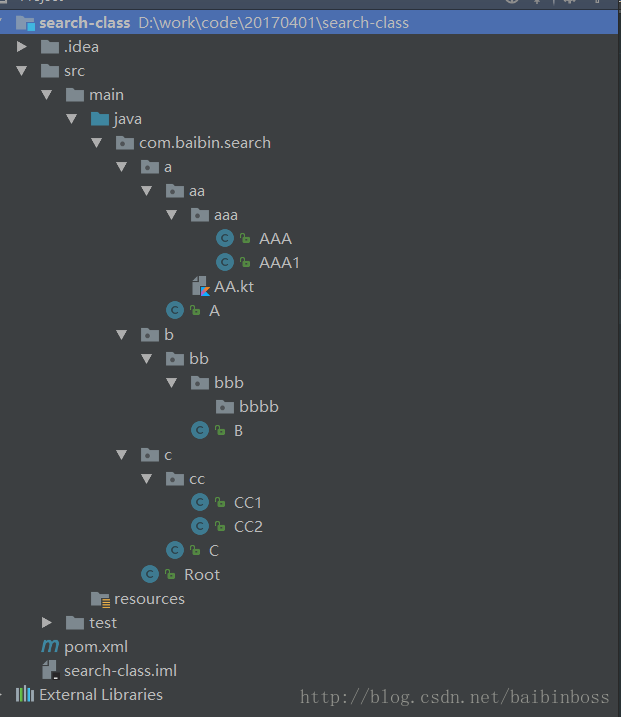在很多的實際場景中,我們需要得到某個包名下面所有的類,
包括我們自己在src里寫的java類和一些第三方提供的jar包里的類,那么怎么來實現呢?
今天帶大家來完成這件事。
src下面的類如何獲取:
首先,比較簡單的是得到我們自己寫的類,我們先來完成這個,
項目的結構圖如下:

我故意創建了這么個比較復雜的項目結構,現在我們就來獲取com.baibin包下所有的類,并且打印他們,代碼如下:
|
1
2
3
4
5
6
7
8
9
10
11
12
13
14
15
16
17
18
19
20
21
22
23
24
25
26
27
28
29
30
31
32
33
34
35
36
37
38
39
40
41
42
43
44
45
|
import org.junit.Test;import java.io.File;import java.util.ArrayList;import java.util.List;public class Main { List<String> classPaths = new ArrayList<String>(); @Test public void searchClass() throws ClassNotFoundException { //包名 String basePack = "com.baibin"; //先把包名轉換為路徑,首先得到項目的classpath String classpath = Main.class.getResource("/").getPath(); //然后把我們的包名basPach轉換為路徑名 basePack = basePack.replace(".", File.separator); //然后把classpath和basePack合并 String searchPath = classpath + basePack; doPath(new File(searchPath)); //這個時候我們已經得到了指定包下所有的類的絕對路徑了。我們現在利用這些絕對路徑和java的反射機制得到他們的類對象 for (String s : classPaths) { //把 D:\work\code\20170401\search-class\target\classes\com\baibin\search\a\A.class 這樣的絕對路徑轉換為全類名com.baibin.search.a.A s = s.replace(classpath.replace("/","\\").replaceFirst("\\\\",""),"").replace("\\",".").replace(".class",""); Class cls = Class.forName(s); System.out.println(cls); } } /** * 該方法會得到所有的類,將類的絕對路徑寫入到classPaths中 * @param file */ private void doPath(File file) { if (file.isDirectory()) {//文件夾 //文件夾我們就遞歸 File[] files = file.listFiles(); for (File f1 : files) { doPath(f1); } } else {//標準文件 //標準文件我們就判斷是否是class文件 if (file.getName().endsWith(".class")) { //如果是class文件我們就放入我們的集合中。 classPaths.add(file.getPath()); } } }} |
效果如下:

總結:這樣的src下面的都比較容易處理,也很容易想到,但是jar包下面的就沒這么簡單了,
但是還是有辦法的。
jar中的類如何獲取:
jar下的類我們可以通過JarURLConnection類來或者,代碼如下:
|
1
2
3
4
5
6
7
8
9
10
11
12
13
14
15
16
17
18
19
20
21
22
23
24
25
26
27
28
29
30
31
32
33
34
35
36
37
38
39
40
41
42
43
44
45
|
import org.junit.Test;import java.io.IOException;import java.net.JarURLConnection;import java.net.URL;import java.util.Enumeration;import java.util.jar.JarEntry;import java.util.jar.JarFile;public class JarMain { @Test public void searchClass() throws IOException, ClassNotFoundException { String basePack = "org.junit"; //通過當前線程得到類加載器從而得到URL的枚舉 Enumeration<URL> urlEnumeration = Thread.currentThread().getContextClassLoader().getResources(basePack.replace(".", "/")); while (urlEnumeration.hasMoreElements()) { URL url = urlEnumeration.nextElement();//得到的結果大概是:jar:file:/C:/Users/ibm/.m2/repository/junit/junit/4.12/junit-4.12.jar!/org/junit String protocol = url.getProtocol();//大概是jar if ("jar".equalsIgnoreCase(protocol)) { //轉換為JarURLConnection JarURLConnection connection = (JarURLConnection) url.openConnection(); if (connection != null) { JarFile jarFile = connection.getJarFile(); if (jarFile != null) { //得到該jar文件下面的類實體 Enumeration<JarEntry> jarEntryEnumeration = jarFile.entries(); while (jarEntryEnumeration.hasMoreElements()) { /*entry的結果大概是這樣: org/ org/junit/ org/junit/rules/ org/junit/runners/*/ JarEntry entry = jarEntryEnumeration.nextElement(); String jarEntryName = entry.getName(); //這里我們需要過濾不是class文件和不在basePack包名下的類 if (jarEntryName.contains(".class") && jarEntryName.replaceAll("/",".").startsWith(basePack)) { String className = jarEntryName.substring(0, jarEntryName.lastIndexOf(".")).replace("/", "."); Class cls = Class.forName(className); System.out.println(cls); } } } } } } }} |
通過這兩種方式我們就可以得到指定包名下面所有的類了,這個還是挺有用的,
比如spring中經常用來掃描指定包注解的實現等。
補充:獲取指定包名下的所有類
寫了一個工具類,用于獲取指定包名下的所有類,支持遞歸遍歷,支持注解過濾,可從 classpath (class 文件與 jar 包)中獲取。
|
1
2
3
4
5
6
7
8
9
10
11
12
13
14
15
16
17
18
19
20
21
22
23
24
25
26
27
28
29
30
31
32
33
34
35
36
37
38
39
40
41
42
43
44
45
46
47
48
49
50
51
52
53
54
55
56
57
58
59
60
61
62
63
64
65
66
67
68
69
70
71
72
73
74
75
76
77
78
79
80
81
82
83
84
85
86
87
88
89
90
91
92
93
94
95
96
97
98
99
100
101
102
103
104
105
106
107
108
109
110
111
112
113
114
115
116
117
118
119
120
121
122
123
124
125
126
127
128
129
130
131
132
133
134
135
136
137
138
139
140
141
142
143
144
145
146
147
148
149
150
151
152
153
154
155
|
import java.io.File;import java.io.FileFilter;import java.lang.annotation.Annotation;import java.net.JarURLConnection;import java.net.URL;import java.util.ArrayList;import java.util.Enumeration;import java.util.List;import java.util.jar.JarEntry;import java.util.jar.JarFile;public class ClassUtil { // 獲取指定包名下的所有類 public static List<Class<?>> getClassList(String packageName, boolean isRecursive) { List<Class<?>> classList = new ArrayList<Class<?>>(); try { Enumeration<URL> urls = Thread.currentThread().getContextClassLoader().getResources(packageName.replaceAll("\\.", "/")); while (urls.hasMoreElements()) { URL url = urls.nextElement(); if (url != null) { String protocol = url.getProtocol(); if (protocol.equals("file")) { String packagePath = url.getPath(); addClass(classList, packagePath, packageName, isRecursive); } else if (protocol.equals("jar")) { JarURLConnection jarURLConnection = (JarURLConnection) url.openConnection(); JarFile jarFile = jarURLConnection.getJarFile(); Enumeration<JarEntry> jarEntries = jarFile.entries(); while (jarEntries.hasMoreElements()) { JarEntry jarEntry = jarEntries.nextElement(); String jarEntryName = jarEntry.getName(); if (jarEntryName.endsWith(".class")) { String className = jarEntryName.substring(0, jarEntryName.lastIndexOf(".")).replaceAll("/", "."); if (isRecursive || className.substring(0, className.lastIndexOf(".")).equals(packageName)) { classList.add(Class.forName(className)); } } } } } } } catch (Exception e) { e.printStackTrace(); } return classList; } // 獲取指定包名下的所有類(可根據注解進行過濾) public static List<Class<?>> getClassListByAnnotation(String packageName, Class<? extends Annotation> annotationClass) { List<Class<?>> classList = new ArrayList<Class<?>>(); try { Enumeration<URL> urls = Thread.currentThread().getContextClassLoader().getResources(packageName.replaceAll("\\.", "/")); while (urls.hasMoreElements()) { URL url = urls.nextElement(); if (url != null) { String protocol = url.getProtocol(); if (protocol.equals("file")) { String packagePath = url.getPath(); addClassByAnnotation(classList, packagePath, packageName, annotationClass); } else if (protocol.equals("jar")) { JarURLConnection jarURLConnection = (JarURLConnection) url.openConnection(); JarFile jarFile = jarURLConnection.getJarFile(); Enumeration<JarEntry> jarEntries = jarFile.entries(); while (jarEntries.hasMoreElements()) { JarEntry jarEntry = jarEntries.nextElement(); String jarEntryName = jarEntry.getName(); if (jarEntryName.endsWith(".class")) { String className = jarEntryName.substring(0, jarEntryName.lastIndexOf(".")).replaceAll("/", "."); Class<?> cls = Class.forName(className); if (cls.isAnnotationPresent(annotationClass)) { classList.add(cls); } } } } } } } catch (Exception e) { e.printStackTrace(); } return classList; } private static void addClass(List<Class<?>> classList, String packagePath, String packageName, boolean isRecursive) { try { File[] files = getClassFiles(packagePath); if (files != null) { for (File file : files) { String fileName = file.getName(); if (file.isFile()) { String className = getClassName(packageName, fileName); classList.add(Class.forName(className)); } else { if (isRecursive) { String subPackagePath = getSubPackagePath(packagePath, fileName); String subPackageName = getSubPackageName(packageName, fileName); addClass(classList, subPackagePath, subPackageName, isRecursive); } } } } } catch (Exception e) { e.printStackTrace(); } } private static File[] getClassFiles(String packagePath) { return new File(packagePath).listFiles(new FileFilter() { @Override public boolean accept(File file) { return (file.isFile() && file.getName().endsWith(".class")) || file.isDirectory(); } }); } private static String getClassName(String packageName, String fileName) { String className = fileName.substring(0, fileName.lastIndexOf(".")); if (StringUtil.isNotEmpty(packageName)) { className = packageName + "." + className; } return className; } private static String getSubPackagePath(String packagePath, String filePath) { String subPackagePath = filePath; if (StringUtil.isNotEmpty(packagePath)) { subPackagePath = packagePath + "/" + subPackagePath; } return subPackagePath; } private static String getSubPackageName(String packageName, String filePath) { String subPackageName = filePath; if (StringUtil.isNotEmpty(packageName)) { subPackageName = packageName + "." + subPackageName; } return subPackageName; } private static void addClassByAnnotation(List<Class<?>> classList, String packagePath, String packageName, Class<? extends Annotation> annotationClass) { try { File[] files = getClassFiles(packagePath); if (files != null) { for (File file : files) { String fileName = file.getName(); if (file.isFile()) { String className = getClassName(packageName, fileName); Class<?> cls = Class.forName(className); if (cls.isAnnotationPresent(annotationClass)) { classList.add(cls); } } else { String subPackagePath = getSubPackagePath(packagePath, fileName); String subPackageName = getSubPackageName(packageName, fileName); addClassByAnnotation(classList, subPackagePath, subPackageName, annotationClass); } } } } catch (Exception e) { e.printStackTrace(); } }} |
以上為個人經驗,希望能給大家一個參考,也希望大家多多支持服務器之家。如有錯誤或未考慮完全的地方,望不吝賜教。
原文鏈接:https://blog.csdn.net/baibinboss/article/details/68947929













